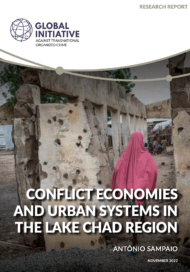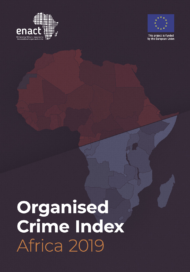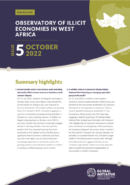Urban areas in the Lake Chad Region are critical sources of revenue for violent extremist Islamist groups such as Islamic State West Africa Province (ISWAP). This study shows that armed groups tracing their origins to Nigeria’s Boko Haram movement, of which ISWAP is one, systematically prey on small but growing towns and the roads that link them to their agricultural hinterland. This network of towns connected by trade and social corridors comprises an urban system, whose weak points are regularly targeted by insurgent groups for both political and economic purposes.
Although insurgents rarely retain control of any towns, their parasitism disrupts food and other economic supply chains in a way that harms the region as a whole. Such predation severely affects the economies of large cities such as Maiduguri (Nigeria) and Maroua (Cameroon), which pay a heavy toll in terms of lives, reduced trading activity and higher costs for transportation and supply chains.
This report examines the role of urban areas in the illicit economies linked to armed conflict in the Lake Chad Region. It is part of the project ‘Promoting Stabilisation Through Crime Sensitive Interventions in West Africa’, funded by Germany’s Federal Foreign Office.
The report’s main focus is on north-eastern Nigeria’s Borno State and Cameroon’s Far North region. Whereas numerous studies have explored the individual funding sources linked to Boko Haram and its breakaway factions, this research focuses on the ways that urban areas, both large and small, have been exploited by insurgents and criminal networks to generate this funding. It also analyzes the socio-economic impact of the conflict on communities throughout the urban system, investigating the ways in which cities, towns, roads and rural hinterlands are interconnected.
The challenges identified in this report are made even more urgent by rising urbanization in the Lake Chad Region, with population growth in towns far outpacing the global average. Nigeria, for instance, is forecast by the United Nations to contribute the world’s third largest increase between 2018 and 2050 (after India and China), with 189 million new urban dwellers – a trebling of the urban population in 2018.
Urban population growth will continue in the region. Armed conflict, if anything, generally accelerates the trend due to population displacement. At the same time, illicit economies linked to Boko Haram/ISWAP, based on predation and smuggling, have continually looked towards the region’s expanding settlements for resources. This sharpens the need for policymakers, development agencies and humanitarian actors to study the vulnerabilities not only of individual communities but of the wider system they make up. This study has shown immense socio-economic damage due to disruptions in vulnerable parts of the region’s economic chains. Improving stability and security in key parts of this system – selected routes and major towns, for instance – could be a first step in allowing communities to build resilience and gradually rebuild their lives.
Les zones urbaines de la région lac Tchad sont des sources de revenus essentielles pour les groupes islamistes extrémistes violents tels que la Province d’Afrique de l’Ouest de l’État islamique (ISWAP). Cette étude montre que les groupes armés, dont l’origine remonte au mouvement nigérian Boko Haram et dont fait partie l’ISWAP, s’attaquent systématiquement aux petites villes en pleine expansion et aux routes qui les relient à leur arrière-pays agricole. Ce réseau de villes reliées par des corridors commerciaux et sociaux constitue un système urbain, dont les points faibles sont régulièrement ciblés par les groupes d’insurgés à des fins tant politiques qu’économiques.
Bien que les insurgés gardent rarement le contrôle des villes, leur parasitisme perturbe les chaînes d’approvisionnement en nourriture et autres produits économiques, ce qui nuit à l’ensemble de la région. Cette prédation affecte gravement l’économie de grandes villes telles que Maiduguri (Nigeria) et Maroua (Cameroun), qui paient un lourd tribut en termes de vies humaines, de réduction des activités commerciales et d’augmentation des coûts de transport et des chaînes d’approvisionnement.
Ce rapport examine le rôle des zones urbaines dans les économies illicites liées aux conflits armés dans la région lac Tchad. Il fait partie du projet « Promouvoir la stabilisation par des interventions sensibles au crime en Afrique de l’Ouest », financé par le ministère fédéral allemand des Affaires étrangères.
Le rapport se concentre principalement sur l’État de Borno, au nord-est du Nigeria, et sur la région de l’Extrême-Nord du Cameroun. Alors que de nombreuses études ont exploré les sources de financement individuelles liées à Boko Haram et à ses factions dissidentes, cette recherche se concentre sur la façon dont les zones urbaines, quelle que soit leur taille, ont été exploitées par les insurgés et les réseaux criminels pour générer ce financement. Le rapport analyse également l’impact socio-économique du conflit sur les communautés dans l’ensemble du système urbain, en examinant la manière dont les villes, les villages, les routes et les arrière-pays ruraux sont interconnectés.
Les défis identifiés dans ce rapport sont rendus encore plus urgents par l’urbanisation croissante dans la région lac Tchad, avec une croissance démographique dans les villes bien supérieure à la moyenne mondiale. Selon les prévisions des Nations unies, le Nigeria, par exemple, devrait connaître la troisième plus forte augmentation au monde entre 2018 et 2050 (après l’Inde et la Chine), avec 189 millions de nouveaux citadins, soit un triplement de la population urbaine en 2018.
La croissance de la population urbaine se poursuivra dans la région. Les conflits armés accélèrent généralement la tendance en raison des déplacements de population. Dans le même temps, les économies illicites liées à Boko Haram/ISWAP, fondées sur la prédation et la contrebande, n’ont cessé de se tourner vers les zones d’habitation en expansion de la région pour trouver des ressources. Il est donc d’autant plus nécessaire que les décideurs politiques, les agences de développement et les acteurs humanitaires étudient les vulnérabilités non seulement des communautés individuelles mais aussi du système plus large qu’elles constituent. Cette étude a révélé d’immenses dégâts socio-économiques dus aux perturbations des parties vulnérables des chaînes économiques de la région. Le renforcement de la stabilité et de la sécurité dans les parties clés de ce système – les routes sélectionnées et les principales villes, par exemple – pourrait être une première étape pour permettre aux communautés de renforcer leur résilience et de reconstruire progressivement leur vie.




